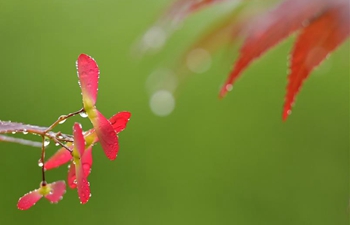SAN FRANCISCO, April 24 (Xinhua) -- The conservation of coral reefs which are on the brink of collapse may get a boost from the gene-editing tool known as CRISPR, according to researchers at the Stanford University School of Medicine.
CRISPR, short for Clustered Regularly Interspaced Short Palindromic Repeats, is a fast, effective tool that can be used to target and modify DNA sequences. It has been a vital technique in molecular biology but applying it to coral reefs proves to be quite challenging because of their spawning cycles.
For the first time, scientists, led by Phillip Cleves, a postdoctoral scholar at Stanford, found definitive evidence that the CRISPR gene-editing tool could be a potent resource for coral biologists, according to statement by Stanford.
Most corals, including the Acropora millepora that was the focus of the study, breed only once or twice a year, during October and November in the Great Barrier Reef, cued by the rise of a full moon.
During a fleeting window, corals release their sex cells into the ocean. When the eggs and sperm meet, they form zygotes. During the narrow time window before these cells begin to divide, a researcher can introduce CRISPR to induce precise mutations in the coral DNA.
Using CRISPR, researchers successfully knocked out fibroblast growth factor 1a, a gene that is thought to help regulate new coral colonization. In some embryos, the gene was largely mutated, suggesting that CRISPR will work well to modify single-copy coral genes.
Cleves said the ultimate goal is not to engineer a genetically resilient super-coral that could populate the ocean.
"Right now, what we really want to do is figure out the basic mechanisms of how coral works and use that to inform conservation efforts in the future," he said in a statement on the official website of Stanford.
"I want this paper to provide an early blueprint of the types of genetic manipulations that scientists can start doing with corals," he added.

















